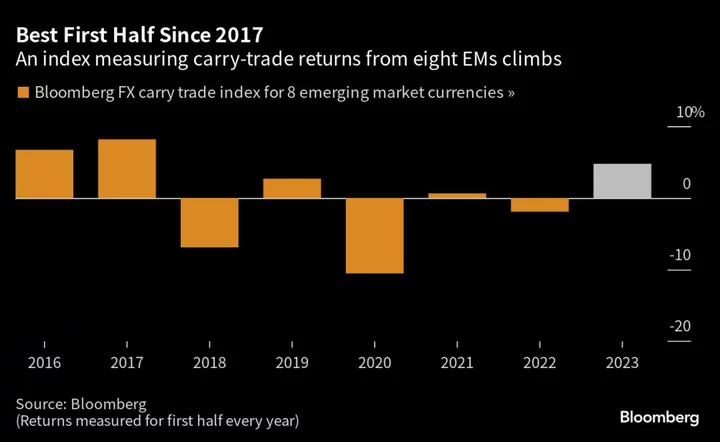Global carry traders are facing a growing sense of anxiety toward anything that threatens to derail one of 2023’s hottest investments.
From the risk of a hawkish Bank of Japan policy shift that may revalue popular funding currency the yen, to a signal in bond markets that the Federal Reserve will hike the US economy into recession, concern is growing among investors that the beneficial low-volatility FX environment may be on its last legs. A return of large swings is often fatal to the strategy of borrowing where interest rates are low and investing in higher-yield, often emerging market currencies.
Strategists from the likes of Deutsche Bank AG and DBS Bank Ltd. are mulling risks that may upend a trade which by one average gauge gained 5% in the first half but depending on the currency pairs used had the potential to return about 40%, according to a measure compiled by Bloomberg.
For DBS strategist Chang Wei Liang, a reversal in the inflation narrative is one such risk, as it is leading to a pickup in currency volatility.
“The Fed is now almost done with rate hikes as inflation pressures abate, while in Japan, inflation is showing signs of life and could trigger a BOJ policy tweak,” Chang said Thursday. “Carry trades, such as being long dollar-yen, are prone to be toppled over if commonly assumed policy trends unexpectedly reverse.”
A surge in the Japanese currency this week has been linked to profit-taking in carry and some hedging against the possibility the BOJ will tweak policy this month in the face of growing inflationary pressures. The yen rose for a seventh straight day on Friday.
“Combined with an uptick in volatility in rates markets and some dent in broader risk sentiment, the carry trade is getting carted away,” wrote Jefferies strategist Brad Bechtel.
Stock Shift
DBS isn’t alone in thinking of triggers. Deutsche Bank sees a big spike in VIX, the volatility gauge for US stocks, as one of the most likely catalysts for a sustained unwind in the FX carry trade. That could happen if the equity market’s expectation of a so-called soft landing scenario is challenged.
“Slowing economic growth as mirrored in the recent decline in the US PMI should be pushing FX volatility higher,” strategists including Rohini Grover wrote in a recent note. “But, the very depressed level of equity volatility is offsetting this deterioration keeping FX volatility contained.”
Mahjabeen Zaman, head of FX research at ANZ, is worried about a slowdown in economic activity impinging on dollar-yen. That could occur if easier monetary policy returns to the US, bringing down the gap between US and Japanese interest rates which so heavily weighed on the yen this cycle.
“The long USD/JPY, one of the most prominent carry trades, could see substantial unwinding once rate differentials are no longer the focus,” she said in an interview this month.
Growth doesn’t even need to slow for the carry trade to come a cropper. Alvaro Vivanco, head of EM and ESG macro strategy at Natwest, has shifted his view on emerging-market carry trades to a more neutral stance on the continued strong performance of the US jobs market and its impact on price pressures there.
“Simply put, given the much better performance of emerging market inflation, we think that carry has peaked in most high-beta currencies,” Vivanco wrote. “This could reverse the positive, and at times very strong, momentum for EM.”
Seeking Shelter
Of course not everyone is betting on an across-the-board imminent unwinding of the carry trade. For one thing, top money managers are bearish on the dollar, which has defied predictions of a prolonged slump since at least the beginning of the year.
And while levels are becoming less attractive, the currencies of countries with strong reserves, balance of payments and prudent central banks are still appealing, according to Esther Law, senior investment manager for emerging-markets debt at Amundi SA in London.
“The Mexican peso is one I think can withstand an unwind well,” Law said. “Countries where the central banks can support the currency should also stand well such as India.”
The Colombian peso, Brazilian real and South African rand are “decently positioned” given their more favorable valuations, “but it may still be a bumpy ride with divergent monetary policies between emerging and developed markets,” said Carlos de Sousa, emerging markets debt portfolio manager at Vontobel Asset Management in Zurich.
On a geographic basis, Asia is most likely to offer shelter, Amundi’s Law said in an interview last week.
“I expect APAC to be less affected than Latam and EMEA at times of carry trades unwind as most of the crowded positioning and high yield currencies are concentrated in Latin America,” she said.
--With assistance from Ruth Carson.
(Updates with Friday’s yen move.)









